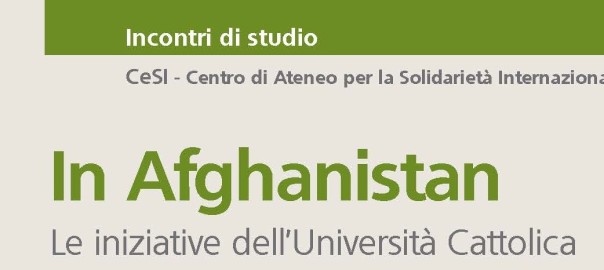Breve intervista per Ispi sulla situazione in Mali, rilasciata da Marco Lombardi.
Dilemas de la Monarquìa Marroquì – by Juan Ignacio Castien Maestro
Al iniciarse la segunda década del siglo XXI la Corona marroquí parece contar con bastantes motivos para sentirse tranquila y satisfecha. Medio siglo después de la independencia continúa controlando el juego político y conservando la iniciativa estratégica dentro del país. No dispone de un poder ilimitado, ni puede obrar a su antojo y ha de negociar a menudo con las distintas fuerzas políticas y sociales. Pero en estas negociaciones acostumbra a hacer prevalecer sus propios objetivos, cediendo menos de lo que gana, atrayendo al otro hacia su terreno y poniéndolo a su servicio. Estos métodos le permitieron hace ya tiempo domesticar y desarbolar a los nacionalistas y a una gran parte de la izquierda y ahora se apresta a aplicarlos con los islamistas
Dowoload del paper: MonarquiaMarroqui
L’Afghanistan sotto casa – by Marco Lombardi
Gli entusiasmi troppo facili per la Primavera Araba si sono raffreddati e già si guarda alla stagione invernale. Queste ultime ore hanno rallentato forse di un tempo il succedersi delle stagioni, considerato che dalle elezioni del 7 luglio in Libia emerge una vittoria della coalizione moderata dall’ex premier del Cnt Mahmoud Jibril. Ma si tratta di una vittoria limitata agli 80 seggi riservati ai partiti e, dunque, aperta soprattutto alle insidie dei 120 eletti nei seggi indipendenti. Non mi stupirebbe da qui un rilancio dei Fratelli Musulmani: se tra i partiti ci si aspetta una trentina di donne elette, tra gli indipendentisti solo una e questo potrebbe essere indicatore di un atteggiamento più radicale. In ogni caso il Paese, che conferma l’impronta laica del Colonnello concretizzata anche nella repressione dei movimenti più radicali, è frammentato in una miriade di rivalità tribali e claniche che rendono assai incerto un indirizzo nazionale coeso.
A Pesaro, presso il 28° reggimento “Pavia” dell’Esercito, si sta svolgendo il corso “Female Engagement Team”, della durata di 18 giorni e riservato al personale femminile dell’esercito, appositamente selezionato per l’impiego nell’interazione con le donne afghane, in collaborazione con ITSTIME.
Costa Concordia: il vecchio da imparare – by Barbara Lucini
La nave fu una vera gioia: una grande, bella nave, fatta una trentina d’anni prima in un cantiere di Amburgo, con i camminamenti di legno, le cabine con gli oblò, un ristorante, una sala da ballo, un bar, una moschea e una chiesa; una nave insomma come usavano un tempo, una nave come una piccola città da esplorare, in cui camminare da cima a fondo, salire da un ponte a un altro, stare a un parapetto a guardare l’orizzonte o a cercare, fra i passeggeri, la faccia interessante di uno con cui si ha voglia di parlare.
Il naufragio della Costa Concordia – by Marco Lombardi
Il naufragio della Costa Concordia è un caso di estremo interesse per chi si occupa di crisis management, soprattutto sul piano comunicativo e procedurale. La prima pagina del Corriere della Sera di oggi, lunedì 16 gennaio, indica con chiarezza l’eroe (Il Commissario di Bordo salvato con la gamba spezzata) e l’infingardo (Il Comandante scappato): questa sintesi celebra la storia secondo i canoni richiesti dall’opinione pubblica.
“Playground explosions” in Afghanistan: The use of children in suicide attack operations – by Maria Alvanou
The news have been indeed shocking: According to the Afghan authorities, an 8-year-old girl in central Afghanistan appears to have been used for carrying a bomb wrapped in cloth that was detonated remotely when she was close to a police vehicle. It is argued by the authorities that the little girl acted in good faith and knew nothing about the deadly package she was carrying. Also the group behind the attack is still not identified. Continue reading
Responsibility on the web and freedom of academic institutions in EU Member States: a judicial precedent in Greece – by Maria Alvanou
A very important, landmark decision was taken recently by a Greek court. It can serve as an example and precedent of how courts in European countries deal with the phenomenon of criminal liability of Web Providers and hosts regarding the webpages that use their service. This is of special interest, when the webpages are considered to upload material regarded as dangerous to security and public order, a very hot topic for many European states today.
Attacco al PRT di Herat e ad altre istituzioni cittadine – by Marco Lombardi
31 maggio 2011 – L’intensificazione delle attività ostili a RCW e nella città di Herat può essere letta anche con l’accresciuta presenza statunitense nell’area (un consolato USA è stato recentemente aperto ad Herat) e degli interessi iraniani che vertono sulla regione. Indicazioni in tal senso erano state raccolte e Herat nei mesi passati, sottolineando la possibilità di inasprimento del challenge USA – Iran nell’area di Herat.
Gran Torino: Social and Security Implications of the XX Winter Olympic Games – by Chiara Fonio and Giovanni Pisapia
“This paper examines issues relating to the security of the XX Winter Olympic Games, which took place in Turin, Italy, from the 10th to the 26th of February 2006. In doing so it explores three crucial aspects of those Games, first, the general social context, second forms of resistance directed against the Winter Games and third the Integrated Security System (ISS) which was developed for and implemented at the sporting venues. This included installing a number of surveillance technologies that sought to address distinctive security concerns. Our aim is to emphasize not only the trend towards the securitization of mega-events at a national and international level, but to also understand some of the broader social implications of the Olympics. In the process, our work also contributes to the literature on the XX Winter Games which to date has tended to be quite thin and fragmented.”
Read the whole paper: Gran Torino
Serata di presentazione della attività dell’Università Cattolica in Afghanistan
L’Università Cattolica ha avviato da quasi due anni un programma di attività di cooperazione in Afghanistan, realizzato dal Centro di Ateneo per la Solidarietà Internazionale insieme al Provincial Reconstruction Team (PRT) di Herat e a importanti partner italiani quali la Regione Lombardia, i Rotary Club, la Fondazione Fondiaria SAI, Federlegno.
L’iniziativa, che vuole concretamente contribuire alla pacificazione del Paese, ha permesso di rivolgere uno “sguardo dall’interno” di una realtà complessa e, forse, troppo mediatizzata.
Systematic Sexual Violence: a weapon of terror and threat in conflicts – by Maria Alvanou
On April 7-8 the S took place in the Hague, organized by the Grotius Centre for International Legal Studies, the University of Leiden, the International Victimology Institute and the department of Criminal Law of Tilburg University.


